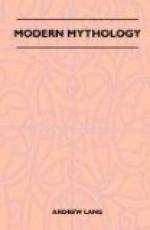Mr. Frazer gives us a similar description of Mannhardt’s method, whether dealing with sun myths or tree myths. {46} ’Mannhardt set himself systematically to collect, compare, and explain the living superstitions of the peasantry.’ Now Mr. Max Muller has just confessed, as a reason for incompetence to criticise Mannhardt’s labours, ’my want of knowledge of the materials with which he dealt—the popular customs and traditions of Germany.’ And yet he asks where there is any difference between his system and Mannhardt’s. Mannhardt’s is the study of rural survival, the system of folklore. Mr. Max Muller’s is the system of comparative philology about which in this place Mannhardt does not say one single word. Mannhardt interprets some myths ’arising from nature poetry, no longer intelligible to us,’ by analogies; Mr. Max Muller interprets them by etymologies.
The difference is incalculable; not that Mannhardt always abstains from etymologising.
Another Claim on Mannhardt
While maintaining that ’all comparative mythology must rest on comparison of names as its most certain basis’ (a system which Mannhardt declares explicitly to be so far ’a failure’), Mr. Max Muller says, ’It is well known that in his last, nay posthumous essay, Mannhardt, no mean authority, returned to the same conviction.’ I do not know which is Mannhardt’s very last essay, but I shall prove that in the posthumous essays Mannhardt threw cold water on the whole method of philological comparative mythology.
However, as proof of Mannhardt’s return to Mr. Max Muller’s convictions, our author cites Mythologische Forschungen (pp. 86-113).
What Mannhardt said
In the passages here produced as proof of Mannhardt’s conversion, he is not investigating a myth at all, or a name which occurs in mythology. He is trying to discover the meaning of the practices of the Lupercalia at Rome. In February, says Dionysius of Halicarnassus, the Romans held a popular festival, and lads ran round naked, save for skins of victims, whipping the spectators. Mannhardt, in his usual way, collects all the facts first, and then analyses the name Luperci. This does not make him a philological mythologist. To take a case in point, at Selkirk and Queensferry the bounds are ridden, or walked, by ‘Burleymen’ or ‘Burrymen.’ {48} After examining the facts we examine the words, and ask, ‘Why Burley or Burry men?’ At Queensferry, by a folk etymology, one of the lads wears a coat stuck over with burrs. But ‘Borough-men’ seems the probable etymology. As we examine the names Burley, or Burry men, so Mannhardt examines the name Luperci; and if a true etymology can be discovered, it will illustrate the original intention of the Lupercalia (p. 86).




